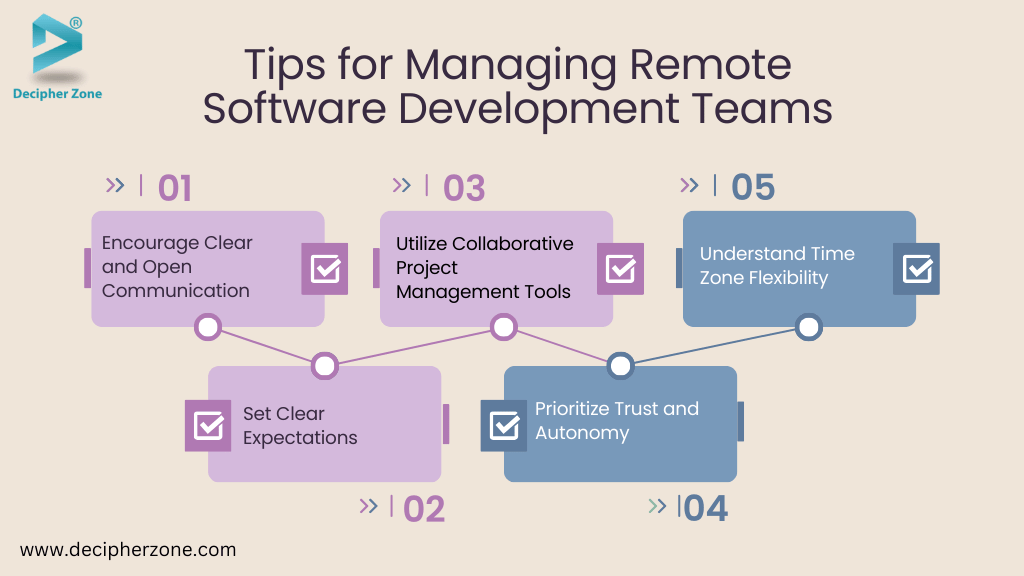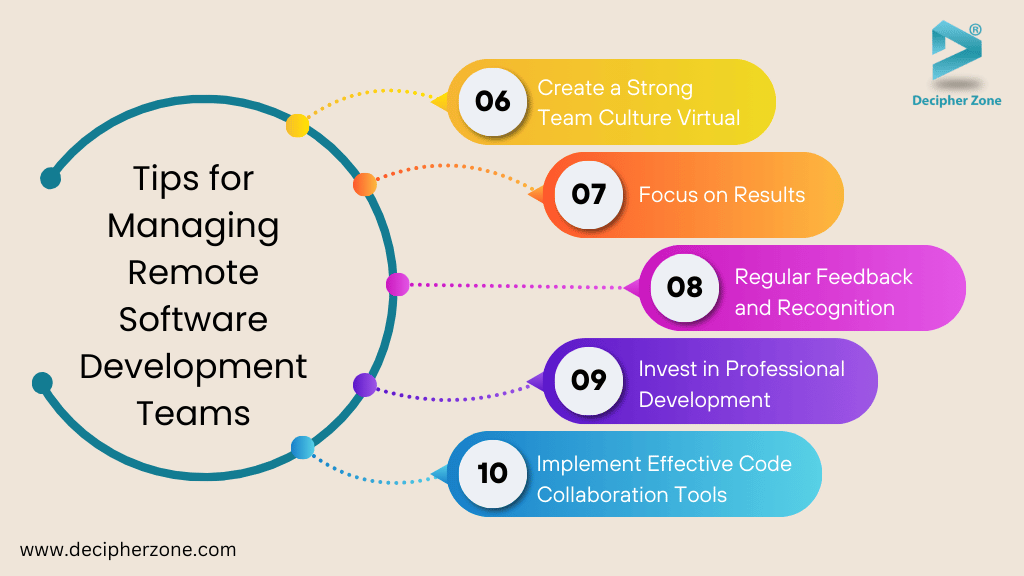Quick Summary: To encounter large pools of proficient software developers, remote software development is the essential expansion for software development firms. With this blog, you can get a few tips to be aware of the challenges you might face. The tips are clear communication, setting clear expectations, utilizing collaborative project management tools, prioritizing trust and autonomy, understanding time zone flexibility, creating a strong team culture, and more.
Software development companies are in the biggest gain with remote work as the new norm, with talent no longer bound by geographical constraints. Now proficient developers can work from any corner of the world. The global pool of developers can encourage innovation and agility like never before.
Remote work does bring innovation along with a few challenges like different time zones, miscommunication, and collaboration spirit. When done right, managing remote teams can boost various benefits, cost savings, increased flexibility, and unparalleled productivity.
The global remote working tools/software market size was valued at USD 30.5 billion in 2024 and is projected to grow at a CAGR of 21.8% between 2025 and 2034.
This era of remote software development is not just about adapting new trends or strategies, it is about embracing a mindset shift that redefines the way we work, collaborate, and build software together.
With the right knowledge and dynamics of managing remote software development teams, you can increase productivity and discover how businesses can thrive.
Tip 1: Encourage Clear and Open Communication
Promoting clear and open communication can help keep everyone on the same page which reduces misunderstandings and encourages collaboration. Scheduling weekly or monthly standups and using video calls to make sure everything is on track reduces miscommunication and streamlines the process efficiently. You can make the communication effective,
-
Defining step-by-step guides to avoid confusion, sharing document procedures clearly, and setting clear expectations.
-
Use the right and most suitable tool for established communication and project management like Slack, Jira, Zoom, etc.
-
Understand team challenges and build trust, prioritizing empathy and connection through active listening.
-
Establishing the communication norms early from the start as to how and when the team should communicate to avoid any kind of risk.
-
Creating non-work chatting spaces to encourage bonding, and informal conversation often promotes relationships and camaraderie.
-
Gather team input to identify communication gaps and improve processes by seeking regular feedback.
Tip 2: Set Clear Expectations
Establishing and setting responsibilities for the remote development team to expect them to achieve the assigned outcome on time.
-
Make sure that the set milestones are achievable, realistic, and attainable.
-
Conduct meetings to make sure the roles and responsibilities are understood.
-
Through these meetings, team members are accountable and show the track of their roles to evaluate their progress. Make sure to motivate them towards their goals.
-
Be mindful of the time zones of your remote developers and schedule meetings and deadlines accordingly.

Tip 3: Utilize Collaborative Project Management Tools
Selecting the right collaborative project management tools is important, Prioritizing security, and offering features such as end-to-end encryption, access control, and audit logs. Avoid cutting corners as this may lead to frustrated team members.
-
These tools provide real-time collaboration that allows every team member to update task statuses, share insights, and quickly address roadblocks.
-
A centralized hub for tracking progress, improving transparency, and identifying bottlenecks before they surge.
-
Remote teams can stay organized, productive, and connected even in any corner of the world.
Tip 4: Prioritize Trust and Autonomy
Remote software development teams require trust and accountability as traits as they work independently and rely upon themselves to complete tasks efficiently and on time.
-
Remote software development teams feel motivated, and more engaged in trusting them to manage their tasks.
-
Autonomy allows them to experiment and find more creative ways. This encourages innovation.
-
Without micromanaging, focus on setting clear expectations and goals. Regular check-ins may provide support but it can be too intrusive.
-
The trust-first approach can help boost job satisfaction and the overall efficiency of the team.
Tip 5: Understand Time Zone Flexibility
Permit remote software development teams to choose the working hours that suit them. The focus should be on completing tasks and not on working hours.
-
Tools can simplify the process of planning meetings and asynchronous communication tools for effective collaboration without requiring everyone to be online.
-
You can create a workflow that keeps the project moving forward even when some team members are offline. This maximizes productivity and reduces downtime.
Tip 6: Create a Strong Team Culture Virtual
Building a reliable team culture in a remote environment is essential to boost morale, enhance collaboration, and create a sense of belonging that drives long-term success.
-
Encouraging different perspectives in discussion, and regular virtual team-building activities including online trivia games, coffee chats, or collaborative challenges, helps build camaraderie.
-
Encourage team members to share personal milestones and achievements to strengthen connections.
Tip 7: Focus on Results
Shifting the focus to the quality and timeliness of their deliverables rather than monitoring the hours remote team members log. You can evaluate productivity by implementing clear performance metrics.
Some of the tools like OKRs (objectives and Key Results) provide measurable goals that align with business objectives. This result-oriented approach promotes flexibility, reduces burnout, increases trust among team members, and encourages developers to work smarter and contribute to a more balanced and efficient work environment.

Tip 8: Regular Feedback and Recognition
Scheduling consistent check-ins and performance reviews to discuss challenges and celebrate achievements leads to regular feedback on effective remote management. Utilizing constructive feedback to help team members to help team members grow while recognizing their contributions to boost morale.
A simple acknowledgment of a job well done. Whether through public shoutouts in Slack or personalized emails which can make a big difference. Recognition encourages a positive work culture and encourages ongoing engagement and ensures that team members feel valued even in a remote setup.
Tip 9: Invest in Professional Development
Investing in professional development can benefit employees and strengthen the overall team. Platforms like Coursera, Pluralsight, or Udemy provide opportunities to learn cutting-edge technologies and methodologies.
-
Motivate the team to take online classes, attend webinars, and participate in workshops to stay updated with industry trends and technology.
-
Offer resources such as sponsorship for certification or time during work hours for learning to demonstrate your investment in their development.
-
This approach increases job satisfaction and loyalty towards the firm benefitting to retain skilled developers.
-
Improving individual skills collectively strengthens the team which leads to innovation and improved project outcomes.
-
An upskilled team delivers better results, adapts to changes quickly, and contributes to the company’s competitive advantage.
Tip 10: Implement Effective Code Collaboration Tools
To enable seamless version control effective code collaboration tools are crucial, especially for remote development teams. Tools like GitHub-GitLab, and Bitbucket ensure all team members access the latest codebase and track changes effectively.
-
Establish a routine for code reviews and pull requests to maintain high-quality standards, encourage knowledge sharing, and catch errors early.
-
Collaborative debugging tools allow real-time debugging and pair programming which enables problem-solving and team collaboration.
-
Standardizing collaborative practices including clear guidelines for branching, merging, and committing code to maintain consistency and streamline development workflows.
-
Creating a culture of sharing best practices and learning during code reviews to strengthen team expertise and build a robust development process.
The Bottom Line
Managing a remote software development team requires a thoughtful combination of the right tools, a culture of trust, and strong collaboration practices. Your team gains the organization and visibility needed to tackle complex tasks seamlessly by implementing project management solutions.
Now that you know the heart of what we offer as a software development company.
At Decipher Zone, we understand the nuances of managing remote software development teams because this is what we do. With years of expertise in delivering world-class software solutions through highly skilled, distributed teams, we have honed our strategies to build trust, encourage creativity, and ensure unmatched quality.

Whether you are looking to scale your operations, streamline workflows, or build a game-changing application, we have the expertise and experience to make it happen. Partner with us and experience the difference of working with a company that prioritizes transparency, innovation, and client success.
Quick Answers: Managing Remote Software Development Teams
-
How do I ensure effective collaboration in a remote development team?
Selecting the right collaborative project management tools is important, Prioritizing security, and offering features such as end-to-end encryption, access control, and audit logs. Avoid cutting corners as this may lead to frustrated team members.
Mainly the biggest challenge in managing remote software development teams is communication barriers. Remote teams often face other difficulties including time zone differences, maintaining productivity, and team collaboration in a virtual setup.
-
How can I track the progress of remote developers effectively?
You can evaluate productivity by implementing clear performance metrics. Some of the tools like OKRs (objectives and Key Results) provide measurable goals that align with business objectives.
Author Bio: Mahipal Nehra is the Marketing Manager at Decipher Zone Technologies, specializing in content strategy, backend development, and digital transformation.
Follow Mahipal on LinkedIn or explore more insights at Decipher Zone.

